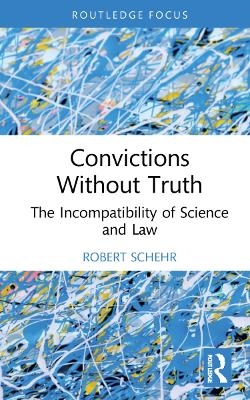
Convictions Without Truth
Routledge (Verlag)
978-1-032-20865-7 (ISBN)
In the first two chapters, readers are exposed to contemporary unscientific forensic practices as juxtaposed to the evidentiary standard announced by the United States Supreme Court in Daubert v. Merrill Dow Pharmaceuticals, as well as scientific requirements for validity and reliability of expert witness testimony. The remaining chapters provide an explanation for retention of existing, though faulty, forensic practices by way of analysis of path dependency, the fixation of belief, and neuro and cognitive psychology. Through immanent critique and unmasking, the book deconstructs prevailing forensic practices through application of existing published documentation. The final chapter addresses the fixation of belief from the perspective of neuropsychology and cognitive psychology. Readers will gain an understanding of the current concerns relating to application of contemporary forensic practices; current case law and federal rules guiding the introduction of expert witness testimony; and why it is that despite widely recognized concerns raised from within and outside of the criminal legal system, application of unscientific forensic practices continues. The book also shows how the criminal legal system is experiencing a paradigm shift due to dialectical juxtaposition of existing unscientific forensic practices with contemporary science. Readers are shown that because of its continued reliance upon unscientific forensic practices, the criminal legal system reveals its hegemonic commitment to social control through its willingness to accept "satisfying" as opposed to "truthful" results that generate wrongful convictions.
Convictions Without Truth will be of particular interest to students, academics, and practitioners working within the criminal legal field. It will also appeal to those wanting to know more about forensics and criminal law.
Robert Schehr is Professor in the Department of Criminology and Criminal Justice at Northern Arizona University, USA. His research expertise and publications focus on Wrongful Conviction, Political Economy of Law and Order, and the Jurisprudence of Plea Bargaining. He is an international speaker on the topic of Wrongful Conviction. Professor Schehr received a PhD in Sociology from Purdue University in 1991, a post-doctoral post at the University of Georgia, and has held positions at Colgate University, and the University of Illinois at Springfield. Dr. Schehr has been a United States Fulbright Scholar, where he taught at both Griffith College Law School and Trinity College Law School, Ireland. Currently he is undertaking a Masters in the Study of Law at Yale University.
Chapter 1: Introduction
Chapter 2: Unscientific Forensic Practices
Chapter 3: Convictions Without Truth
Chapter 4: The Fixation of Belief
Chapter 5: Neuroscience and Cognitive Psychology
Chapter 6: Conclusion
| Erscheinungsdatum | 05.05.2022 |
|---|---|
| Reihe/Serie | Routledge Frontiers of Criminal Justice |
| Verlagsort | London |
| Sprache | englisch |
| Maße | 138 x 216 mm |
| Gewicht | 200 g |
| Themenwelt | Geisteswissenschaften ► Psychologie ► Allgemeine Psychologie |
| Geisteswissenschaften ► Psychologie ► Biopsychologie / Neurowissenschaften | |
| Geisteswissenschaften ► Psychologie ► Verhaltenstherapie | |
| Recht / Steuern ► Arbeits- / Sozialrecht ► Sozialrecht | |
| Recht / Steuern ► EU / Internationales Recht | |
| Recht / Steuern ► Strafrecht ► Kriminologie | |
| ISBN-10 | 1-032-20865-1 / 1032208651 |
| ISBN-13 | 978-1-032-20865-7 / 9781032208657 |
| Zustand | Neuware |
| Informationen gemäß Produktsicherheitsverordnung (GPSR) | |
| Haben Sie eine Frage zum Produkt? |
aus dem Bereich


